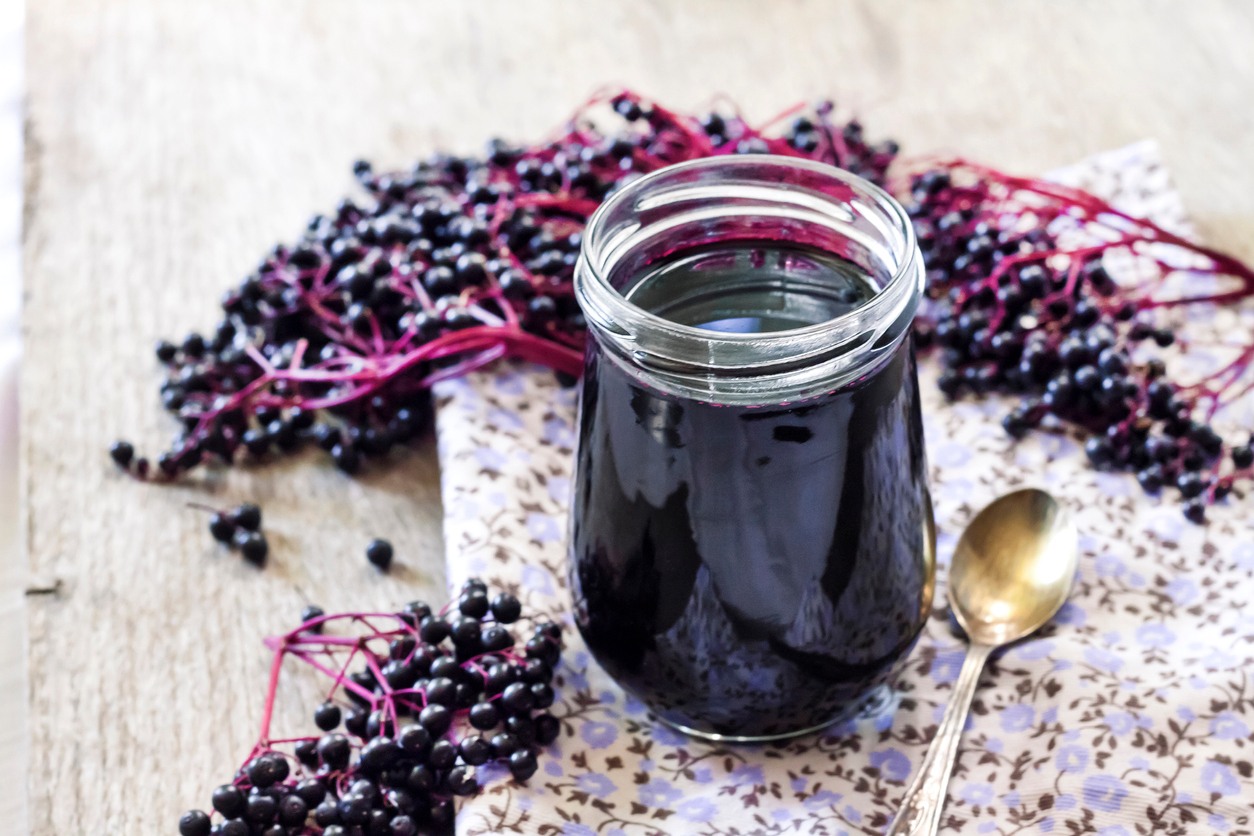Commitment + Clinical Leadership = Better Outcomes

What are the Health Benefits of Elderberry?
Elderberry is a plant and popular supplement known to help with cold and flu symptoms. It’s one of the most common plants in the world to use for medicinal purposes.
Some experts recommend elderberry to help ease sickness and symptoms, as well as being an overall immune support.
But what exactly are the health benefits of elderberry? Here are some ways elderberries can benefit your health, as well as how to consume more elderberries.
What is Elderberry?
Elderberry is several different varieties of the Sambucus tree, a flowering plant that belongs to the Adoxaceae family.1 The most common type is European elderberry, a tree native to Europe, but it’s also grown in other areas of the world.
Elderberry can grow up to 30 feet and has clusters of flowers, known as elderflowers. The berries are found in blue and black bunches.
The flowers can be added to certain meals, but the berries are the most common part of the elderberry that’s consumed.
How is Elderberry Beneficial to Your Health?
Elderberry has a wide range of health benefits, from the nutrients it provides to overall immune support.
Nutrients and Immune Support
Consuming one cup of elderberry provides some of the vitamins and minerals that are significant to our health and need to be consumed each day.
Here are some of the nutrients that elderberry offers:
- Vitamin C – One cup of elderberry contains around 50 milligrams of vitamin C. Vitamin C is essential to our health for many reasons, including lowering blood pressure, boosting collagen, and preventing iron deficiency.3
- Calcium – One cup of elderberry contains around 50 milligrams of calcium. Calcium is a mineral that keeps bones strong, as well as supports muscles and nerves.4
- Fiber – Elderberry contains about 10 grams of fiber in each cup. This is a substantial amount because the recommended amount in a day for an adult is between 28 and 34 grams.5 Fiber is necessary for improving bowel function and reducing blood pressure.
- Flavonols – Flavonol helps to reduce inflammation, as well as aiding in disease prevention.6
- Anthocyanins – This is what gives elderberries their blue and black coloring. Anthocyanins act as antioxidants and may have a positive effect on blood vessels and help fight off infection and diseases.7
Improve Cold and Flu Symptoms
For years, elderberry has been thought to help reduce and relieve cold and flu symptoms. Elderberry is known to support the immune system with its antioxidants, vitamins, and minerals.
In one study, 60 people with flu-like symptoms consumed 15 milliliters of elderberry syrup four times throughout the day. Their symptoms improved four days before the control group. The researchers found that elderberry is an effective and safe way to ease flu symptoms.8
In another study, 32 people with flu-like symptoms consumed lozenges containing 175 milligrams of elderberry extract four times a day for two days. These people reported a significant decline in their symptoms such as fever, headache, and muscle aches. In conclusion, there was a link between elderberry consumption and reduced flu symptoms.9
Elderberry may help improve cold and flu systems due to its antioxidants, vitamins, minerals, anti-viral, and anti-inflammatory properties. This is one example of how elderberry can benefit your health.
Improve Heart Health
Elderberry may improve heart health because it is rich in three different flavanols, which have antioxidants and are great for your heart.10
Some studies have shown that elderberry may be able to reduce cholesterol levels.1 High cholesterol can cause fatty deposits to grow in your blood vessels and put you at risk for heart disease.11 Maintaining healthy cholesterol levels is significant when it comes to heart health.
One study tested 34 people consuming 400 milligrams of elderberry extract three times a day for two weeks, and found a significant decrease in their cholesterol levels.12
Blood sugar is critical to maintain at a healthy level because of the risk of diabetes and heart disease. Elderberry may also improve blood sugar levels because it is high in antioxidants.
Maintaining healthy blood sugar and cholesterol levels is another way elderberry can benefit your health.
How to Consume Elderberry
Elderberry can be consumed or added to your diet in a variety of ways.
Here are some ideas to include elderberries in your meals:
- Tea – Elderberry is often sold as tea and juice. This is a great choice to consume nutrients from elderberry as well as drinking something that can be easy on your digestive system.
- Elderberry syrup – Elderberry syrup can be found in some grocery stores or markets, and you can make your own as well. The syrup can be added to any tea, juice, lemonade, or your favorite drink.
- Jams – Elderberries can be cooked and turned into jam or . The jam can be used on toast or as a great addition to a charcuterie board.
- Pie – If you’re into sweets, make an elderberry pie. This dessert will fix your sweet tooth craving, as well as provide you with all the nutritional benefits of elderberry.
- A dose of elderberry – Some people take a teaspoon of elderberry simply for immune support. This is ideal with the elderberry syrup, or if you want to try an elderberry supplement such as a gummy.
Saber Healthcare is an organization dedicated to providing consultant services to long term care providers. This article is for informational purposes and is not meant to be seen as professional advice. Please consult with a medical expert before relying on the information provided.
Sources
- https://www.healthline.com/nutrition/elderberry.
- https://www.medicalnewstoday.com/articles/323288.
- https://www.mountsinai.org/health-library/supplement/vitamin-c-ascorbic-acid#:~:text=It%20helps%20the%20body%20make,absorb%20iron%20from%20nonheme%20sources.
- https://ods.od.nih.gov/factsheets/Calcium-Consumer/.
- https://health.gov/sites/default/files/2019-09/2015-2020_Dietary_Guidelines.pdf.
- https://www.livescience.com/52524-flavonoids.html.
- https://www.verywellhealth.com/the-scoop-on-anthocyanins-89522.
- https://pubmed.ncbi.nlm.nih.gov/15080016/.
- https://www.ncbi.nlm.nih.gov/pmc/articles/PMC4848651/.
- https://share.upmc.com/2020/02/benefits-of-elderberry/.
- https://www.mayoclinic.org/diseases-conditions/high-blood-cholesterol/symptoms-causes/syc-20350800#:~:text=Your%20body%20needs%20cholesterol%20to,to%20flow%20through%20your%20arteries.
- https://pubmed.ncbi.nlm.nih.gov/14749743/.
